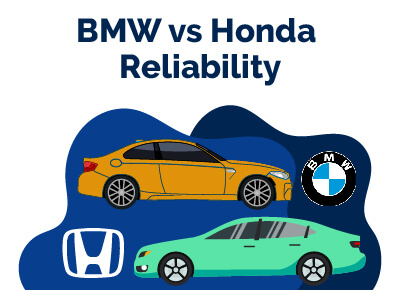BMW vs Honda: Reliability Comparison
June 12, 2023


Chris is Head of Content for FindTheBestCarPrice and is based out of Philadelphia, PA. As a seasoned automotive industry analyst and car enthusiast, he ensures the highest level of quality across all our content and curates our picks for the best deals each month.
Chris studied information systems and marketing at Drexel University and writes about a wide range of topics ranging from car buying tips to troubleshooting common mechanical issues.
When he’s not thinking about cars, he likes to stay in with his dog and make an “attempt” to finish a crossword puzzle (he’s not quite at the Saturday/Sunday level…yet). As a former cheesemonger, Chris still has a “sharp” passion for all things cheese, and his fridge is always loaded with it!
Chris also has a passion for things that go fast, and drones are no exception. He spends some of his time writing for Dronesourced.
BMW is renowned for producing exquisitely designed, high-quality cars. BMW interiors are just as impressive as their exteriors, boasting luxurious high-end leather seats and state-of-the-art technology.
Honda is celebrated for its pioneering ethos, exceptional technological benchmarks, and unwavering commitment to excellence.
Every Honda product embodies years of technical expertise, ongoing research and development, and attention to quality control.
Here we cover the BMW vs. Honda reliability including design, repair and maintenance cost, the durability, engine, and more. Learn why Honda cars are more reliable than BMW.
Table of Contents
BMW vs. Honda Reliability: Detailed Comparison
| Features | BMW | Honda |
| Design | ||
| Repairs and maintenance cost | ||
| Durability | ||
| Engine | ||
| Gas mileage | ||
| Technology | ||
| Safety |
Which Is the Best Car: BMW or Honda?
These automotive juggernauts boast impressive engineering, unparalleled performance, and opulent design. However, a nuanced comparison of the respective brands reveals differences and similarities.
For many years, BMW has been synonymous with lavishness, top-tier performance, and innovative technology, embodied by the renowned M series and the sophisticated Z4.
With a dedication to exacting engineering, nimble handling, and meticulous craftsmanship, BMW has solidified its reputation as a paragon of excellence.
Conversely, Honda has built a reputation on practicality, affordability, and reliability. For example it has the Civic and Accord models acclaimed for their fuel efficiency, low maintenance costs, and long-lasting endurance.
As a brand that appeals to the practical-minded driver, Honda carved out a niche as a dependable and durable option.
The answer to the age-old question of whether BMW or Honda is the superior car depends on an individual's preferences and needs.
Those prioritizing luxury, performance, and cutting-edge automotive technology will likely opt for BMW. On the other hand, if practicality, reliability, and affordability are more important, Honda may represent a superior option.
1. BMW vs. Honda Reliability: Design
BMW is a long-standing successful brand. It focuses on crafting sporty, high-performance cars, adorning them with luxurious materials, and providing excellent service and customer loyalty.
The brand incorporated several signature elements to its iconic status, including the quad headlights, originally intended to denote a higher trim level but now synonymous with the brand.
The roundel, representing pride and heritage, remains an enduring symbol on all BMW models, with its blue and white colors evocative of Bavaria, the birthplace of top-tier automobiles.
In contrast, Honda offers futuristic and contemporary designs, distinguished by sleek angles and bold contours.
The brand expanded its range of models to include larger vehicles like the Pilot and Passport, allowing them to compete effectively.
Honda's interior design prioritizes practicality and functionality while providing comfort and style.
Winner: BMW
2. BMW vs. Honda Reliability: Repair and Maintenance Cost
Maintenance and repair costs are critical considerations for reliability.
On average, BMW models incur maintenance and repair expenses totaling approximately $19,312 during their first ten years of service. This exceeds the industry average for luxury brands by a staggering $7,268.
In contrast, Honda models have an average maintenance and repair cost of around $7,827 for the first 10 years. This exceeds the industry average for popular brands by $1,013.
Although the likelihood of significant repairs within that time is 17.69%, Honda vehicles are designed for longevity. Their modest features contribute to their durability and lower maintenance costs over time.
Winner: Honda
3. BMW vs. Honda Reliability: Durability
A BMW can run up to 200,000 or even 250,000 with proper maintenance. Some outliers may even exceed this mileage.
BMW Ultimate Care provides complimentary factory-recommended maintenance to ensure a good start.
Honda models also achieve around 200,000 miles with proper care. If the driver covers 10,000 to 15,000 miles per year, the Honda can last for 15 to 20 years, sometimes even longer.
With proper care, BMW and Honda both have impressive longevity potential. It ultimately depends on individual driving habits and maintenance practices.
Winner: Honda
4. BMW vs. Honda Reliability: Engine
BMW has engines in various layouts, including inline/straight three, V10, and V12.
BMW's latest TwinPower Turbo petrol engines incorporate cutting-edge turbocharger technology, fully-variable VALVETRONIC valve timing with double VANOS valve control, and high precision direct injection. They’re more fuel-efficient, economical, and powerful than ever before.
On the other hand, Honda engines are renowned for their consistent and accessible start. They boast an automatic mechanical decompression system, heavy-duty recoil ropes, and variable ignition timing.
Honda is committed to advancing technology and incorporates direct fuel injection and variable valve timing into its engine. That’s how it delivers exceptional fuel efficiency and low emissions.
Both BMW and Honda have unique engine designs and performance strengths, making it challenging to declare a clear winner.
However, BMW's focus on developing innovations for fuel efficiency and power sets it apart.
In contrast, Honda's commitment to consistency and advanced technology for efficiency and emissions makes it a reliable and practical choice for drivers.
Winner: Both
5. BMW vs. Honda Reliability: Gas Mileage
The 2021 BMW 330e is a technologically advanced vehicle. It uses electricity and premium gasoline to power its four-cylinder, 2.0 L engine, and automatic transmission.
This results in an impressive combined MPG of 75 MPGe on electricity and 28 MPG on gas alone, with city and highway MPG of 3.6 and 0.0 gallons per 100 miles of gas, respectively.
Its counterpart, the 2021 BMW 330e xDrive, is a plug-in hybrid with a combined MPG of 67 MPGe on electricity and 25 MPG on gas alone. It has a city and highway MPG of 4.0 and 0.0 gallons per 100 miles of gas, respectively.
In contrast, Honda's relentless emphasis on fuel efficiency is essential to its brand persona. In contrast, Honda’s gas mileage is a crucial element of its brand identity, marked by its persistent manufacture of fuel-efficient automobiles.
The 2022 Honda Accord and the Civic boast 30 and 32 miles per gallon, respectively, in cities and 38 and 42 miles per gallon on the highway.
Cutting-edge technologies, like direct fuel injection and variable valve timing, optimize fuel efficiency and diminish emissions. These considerations reflect Honda's innovative approach to eco-friendliness and fuel efficiency. As a result, the Honda brand stands out as a forerunner in this area.
Winner: Honda
6. BMW vs. Honda Reliability: Technology
BMW's Wireless Apple CarPlay and Android Auto allow drivers to access their phone's features without connecting the device to the car physically.
The wireless connection uses Bluetooth or Wi-Fi, and the phone's display and controls are mirrored on the car's infotainment system.
Drivers can store their phones safely while accessing its features through the car's display.
BMW's wireless charging technology is also a convenient feature allowing drivers to charge their compatible devices without cables or plugs.
The wireless charging apparatus typically comprises a charging pad employing electromagnetic induction to convey energy from the pad to the gadget.
Correspondingly, Honda's array of precautionary and driver-aid technologies (Honda Sensing) offers additional stratum of safety during vehicular travel.
This suite of technologies includes features such as a collision mitigation braking system, lane-keeping assist system, and adaptive cruise control. They all work together to alert drivers to potential hazards and help prevent accidents.
Ultimately, choosing these technologies will depend on individual preferences and needs.
Winner: Both
7. BMW vs. Honda Reliability: Safety
BMW's restraint system for the driver and front passenger incorporates a combination of three-point seat belts with integral tensioners and force limiters. It ensures that occupants remain securely seated even during a collision. The rear seat belt buckles are marked to prevent any incorrect fastening.
Dynamic stability control (DSC) add to the vehicle's safety by enhancing its control even in adverse driving conditions or on challenging surfaces. It detects potential skidding risks, and stabilises the car in milliseconds.
The traction mode control in dynamic traction control (DTC) allows for increased wheel slip, enabling more dynamic driving.
The anti-lock brake system (ABS) ensures that the vehicle remains entirely under control even when applying full force to the brakes.
It does so by precisely regulating the braking pressure on individual wheels, preventing them from locking. It does this regardless of the road surface's friction coefficient and the applied brake pressure.
Honda's body design, exclusive to its vehicles, protects passengers in frontal collisions by more evenly distributing crash energy throughout the front of the vehicle.
The front seat belts feature a pretensioner and load limiter. Upon detecting a substantial frontal impact, it instantaneously retracts and yields slightly. This reduces the pressure applied to the occupant's chest.
Additionally, every Honda vehicle is outfitted with advanced airbag technology, which includes front airbags as standard equipment.
Specific models may also feature SmartVent front-side airbags, side curtain airbags with rollover sensors, and front knee airbags to offer even more excellent protection in a collision.
Both BMW and Honda demonstrate their unwavering commitment to driver and occupant safety. They each offer comprehensive safety featuresto prevent accidents and protect passengers.
Winner: Both
Final Verdict
All the parameters covered in this piece indicate that Honda is more reliable than BMW.
BMW are beautiful and reliable cars, but they are not as reliable as Honda when considering all key facets of reliability.
Best Car Deals by Category
Posted in Car Buying Tips, Car Troubleshooting |




